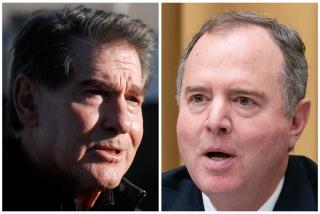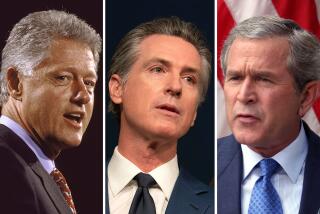GOP Infighting May Trouble Simon Campaign
Just as Bill Simon Jr. is struggling to unite the fractious California Republican Party behind his campaign for governor, a new round of infighting has erupted among state GOP leaders.
The clash threatens to disrupt Simon’s effort to build momentum among fellow conservatives and broaden his appeal to moderates for his bid to unseat Gov. Gray Davis in November.
At the center of the fight is Gerald L. Parsky, President Bush’s top political operative in California. By normal political calculations, Parsky would be one of Simon’s most important allies--a bridge to the popular president and the vast campaign resources of the White House. Parsky, a wealthy investment banker, is also the most powerful player in raising--and deciding how to spend--millions of dollars for the state Republican Party.
But Simon’s come-from-behind victory in the March 5 primary set up multiple tensions among Parsky, the new GOP nominee and conservatives who were loyal to Simon before he defeated former Los Angeles Mayor Richard Riordan and California Secretary of State Bill Jones.
For one thing, Simon and Parsky were on opposite sides of a fierce business dispute in the early 1990s--although they have vowed to put it behind them as they work to oust the Democratic governor.
There is also political friction: The White House supported Riordan in the primary. Now, some key Simon supporters are blaming that on Parsky, the president’s most visible West Coast operative.
Parsky also is under fire for the ongoing, Bush-ordered reforms of the state GOP leadership, which has weakened the conservatives’ hold on the party apparatus. “Gerry Parsky should do the honorable thing and step aside so that he doesn’t become a further embarrassment to the White House or to the state party,” said former state GOP Chairman Michael Schroeder, echoing the comments of several other conservative leaders.
In fact, even Riordan campaign insiders say Parsky was steadfastly neutral during the primary. It was not Parsky, but Riordan’s former business partner Brad Freeman--a close friend of the president who works largely behind the scenes--who was most influential in winning White House support for Riordan.
Schroeder’s remarks came as an unwelcome jolt to the Simon campaign. With Parsky planning a Bush trip to California next month to raise money for Simon, the candidate’s team is scrambling to stifle criticism of the president’s California point-man.
The awkwardly timed jab at Parsky, in a Times interview, prompted Simon advisors to turn their backs on Schroeder--an Orange County activist whose support they proudly showcased just last month when they dispatched him to a news conference to trash Riordan as a disloyal Republican.
“Schroeder is not authorized to make those statements on behalf of the campaign, and they do not reflect the views of the senior management of the campaign,” Simon’s campaign chairman, John Herrington, said when informed of the anti-Parsky remarks.
“The election of Bill Simon is dependent on a close working relationship with the president and his designated representative in California. So far, that relationship has been very close, and Parsky has been very helpful since the primary was over.”
Wounds Won’t Easily Heal
The wounds are not easily salved, however, for they reflect both long-standing and recent disputes between the Simon camp and Parsky.
The day after the primary, Simon’s inner circle was dismayed by Parsky’s seeming criticism of the new nominee. The New York Times quoted Parsky as saying that an “extreme conservative” could not win in California, and suggesting that Simon’s hopes in November depended on his agreeing to “adopt the formula I describe” to broaden the party to moderates. Parsky told the San Francisco Chronicle that the state GOP had to shed its image as a party “dominated by extremists.”
Coming just days after Riordan had dismissed Simon as an “extremist,” Parsky’s comments were widely seen as an attack on the nominee. They also revived speculation about lingering bitterness from the Simon-Parsky business feud.
Dick Mountjoy, president of the conservative California Republican Assembly, described Parsky as “arrogant” and “out of step with the rank-and-file Republican in California.”
“He believes the party can be run from a country club; all it takes is money, and forget the grass roots, and change the party principles so we don’t believe in anything,” Mountjoy said.
Parsky, who commutes daily in his private jet between his ranch north of San Diego and his office in Westwood, said he was misunderstood. He said he does not consider Simon an extremist and believes he can win if he continues to stress school reforms and the state fiscal crisis. “I can say very strongly that I will support his candidacy,” Parsky said.
As for his business dispute with the candidate and his late father, former U.S. Treasury Secretary William E. Simon, Parsky denied there was lasting friction.
“Any differences were with his father,” Parsky said.
When the breach occurred, though, Parsky cast Bill Simon Jr. as a key source of the conflict. Parsky, now 59, had been a top aide to Simon’s father during the Nixon and Ford administrations, when the elder Simon was Treasury secretary. In the late 1980s, Parsky and the elder Simon became partners in a wide array of savings-and-loan and other investments. They abruptly broke ties in 1991.
“I totally lost trust and confidence in Gerald L. Parsky and no longer wished to be associated with him either professionally or personally,” William E. Simon said at the time.
Parsky Says Simon Cut Ties
Parsky gave a different account to Forbes magazine in 1992, saying Simon had cut their business ties because Parsky had refused to make Bill Simon Jr. a full partner.
Bill Simon Jr. declined to discuss the matter.
“It really had to do with things between Dad and Gerry, and that’s really about as far as I want to take it,” he said.
For now, Simon and Parsky are working together. Parsky was in Sacramento last week at a Simon appearance with Republican leaders.
Karl Rove, Bush’s chief political strategist at the White House, said Simon and Parsky have been “very positive” about each other. Since the primary, Parsky has helped to rally Riordan supporters and others behind Simon, and he remains “the leader of our political team out there,” Rove said.
“He’s there to help facilitate whatever the Simon campaign wants within reason from the White House and from the Bush people,” Rove said.
Parsky’s ties to the Bush family date to 1976. At the time, former President George Bush was director of the CIA. He met from time to time with Parsky, whose frequent travels abroad for the Treasury Department required him to keep in close touch with the CIA.
Parsky cultivated a friendship with the elder Bush. The former president once described Parsky in a videotaped testimonial as “not afraid to roll up his sleeves and get involved in the political arena when a lot of people are running for cover.” During Bush’s 1992 campaign, First Lady Barbara Bush stayed at Parsky’s ranch.
In 1996, Parsky spent time with their son, George W. Bush, then governor of Texas, at the Republican National Convention in San Diego; Parsky was a leader of the city’s convention host committee. Two years later, they met again when Bush was raising money in California, and Parsky eventually signed on to lead Bush’s California presidential effort.
Bush lost the state by 1.3 million votes, but maintained confidence in Parsky. The president has put Parsky in charge of his selection process for the state’s federal judges, U.S. attorneys and marshals. It’s a role normally filled by a U.S. senator or governor from the president’s political party, but in California all three are Democrats.
Since the 2000 election, Parsky’s main political task has been to “professionalize” state Republican Party operations, giving big donors a greater say in how their money is spent. Parsky’s reforms have stripped party Chairman Shawn Steel of most of his powers, a move that provoked sharp dissent from Steel, Schroeder and other party insiders. Under the new system, party spending is controlled by a five-member operations committee dominated by Parsky and his ally, state Senate Republican leader Jim Brulte of Rancho Cucamonga.
That party overhaul continues to divide state Republicans. During an operations committee meeting last week, Parsky and Brulte scolded Steel for sending e-mails casting Parsky in an unfavorable light to scores of party activists.
More significant, perhaps, Ron Rogers, Simon’s new representative on the committee, joined in taking Steel to task. But Simon strategist Sal Russo said GOP leaders were “all on the same page.”
“Our basic attitude is that we want a unified Republican Party,” he said. “And I know we have it.”
More to Read
Get the L.A. Times Politics newsletter
Deeply reported insights into legislation, politics and policy from Sacramento, Washington and beyond. In your inbox three times per week.
You may occasionally receive promotional content from the Los Angeles Times.








